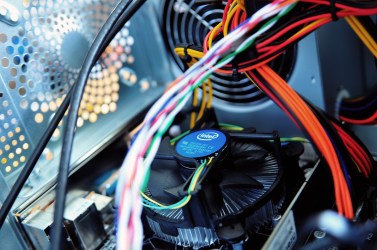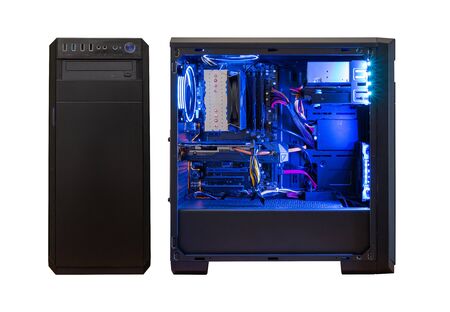The computer stores low-level settings such as system time and hardware settings in its CMOS. These parameters are configured in a menu BIOS Setup or UEFI. If you have a hardware compatibility issue or another issue, you can try clearing the CMOS.
Clearing the CMOS resets the BIOS or UEFI settings to their original state. In most cases, you can clear the CMOS from the BIOS menu or by pressing the CMOS button on the back. In some cases, you may need to open the computer case.
The easiest way to clear CMOS is to use the computer’s BIOS or UEFI setup menu. To access the configuration menu, restart your computer and press the onscreen key—mostly Del or F2—to access the configuration menu.
If you don’t see a key appear on your screen, check your computer manual. Different computers use different keys. (If you built your own, consult your motherboard manual instead.)
Keys to access various BIOS options are displayed during the POST test.
If you’re using Windows 8, Windows 10, or Windows 11, you can most likely access the BIOS or UEFI from Windows itself.
In the BIOS, look for the Reset option. It might be called “Reset to Default”, “Load Factory Defaults”, “Wipe BIOS Settings”, “Load Setup Defaults” or something similar.
Select it with the arrow keys, press Enter and confirm the operation. If you are using a computer with UEFI instead of BIOS, you will likely be able to use a mouse.
Your BIOS or UEFI will now use its default settings – if you’ve changed any settings in the past, you’ll need to change them again.
Click “Load setup defaults”.
Press the clear CMOS button
Newer motherboards, especially more expensive ones designed for enthusiasts, often have a special CMOS scan button.
This button can be located on the back of the motherboard, near all the ports, or on the motherboard itself, inside the case. The manual that came with your computer or motherboard will tell you exactly where to find it.

Once you locate the clear CMOS button, press it for about 10 seconds. You may need a paperclip for this – CMOS scan buttons are usually sealed near the ports on the back to prevent them from being accidentally pressed.
The CMOS scan button is on the back of the ASRock motherboard.
The CMOS buttons on the motherboard are usually clearly marked, and are usually not recessed. However, you will have to hold down for a few seconds to start the reset.
Use the CLEAR CMOS jumper on the motherboard
Many motherboards have a jumper that can be used to clear CMOS settings if your BIOS is not accessible. This is especially useful if the BIOS is password-protected and you don’t know it, or if you’ve made changes that prevent you from accessing the BIOS normally.
The exact location of the jumper can be found in the motherboard (or computer) manual. You need to check the manual for more detailed instructions if you want to use a motherboard jumper.
However, the basic process is quite similar on all computers. Turn the computer’s power switch to the off position to make sure there is no power on it. Open the computer case and locate the jumper named CLEAR CMOS, CLEAR, CLR CMOS, PASSWORD, or CLR PWD – often near the CMOS battery listed below.
Before touching it, make sure that you are connected to the ground so as not to damage the motherboard with static electricity.

Replace the CMOS battery
If your motherboard does not have a CLEAR CMOS jumper or button, you can often clear its CMOS settings by removing and replacing the CMOS battery. The CMOS battery saves the power used to save BIOS settings – this is how your computer knows how much time has elapsed, even if it’s been turned off for a while – removing the battery removes the power supply and clears the settings.
First, make sure your computer is turned off and that you are grounded so you don’t damage the motherboard with static electricity. Locate the flat, round silver battery on the motherboard and carefully remove it. Wait five minutes before reinstalling the battery.
CMOS should always be cleared for a specific reason, such as troubleshooting a computer problem or clearing a forgotten BIOS password. There is no reason to clear the CMOS if everything is working fine.
Similar products

“Certified gamer. Problem solver. Internet enthusiast. Twitter scholar. Infuriatingly humble alcohol geek. Tv guru.”





